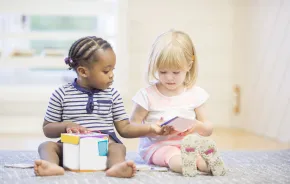
At age 3, my eldest threw a 20-minute tantrum while a teacher and I tag-teamed sitting with her as she raged, cried, kicked and sobbed. I kept asking what I needed to do differently. How could I help my daughter? The teacher said I was helping her; all she needed was a caring adult to be with her.
I wanted a better answer, and 10 years later I received one while talking with Deborah MacNamara, a developmental psychologist at Vancouver, B.C.’s Neufeld Institute and the author of Rest, Play, Grow: Making Sense of Preschoolers (Or Anyone Who Acts Like One).
I spoke with MacNamara in anticipation of her talk this Saturday, May 21, at Solid Ground in Seattle. During the presentation, she’ll discuss what kids ages 2 to 6 wish caregivers understood about them and how that knowledge can inform parenting choices. Her book is based on the teachings of child development authority development psychologist Gordon Neufeld, an internationally renowned speaker with more than 40 years of experience with children and youth.
In hopes of making parenting preschoolers less difficult, here’s the scoop on everything preschool from my conversation with MacNamara.
Ages 2 to 6 have a reputation among parents as being particularly frustrating. Why are these years so difficult?
The preschooler personality is unpredictable. They’re up or down, with intense swings in emotion. Preschoolers lack impulse control. They know better, but they don’t do better. They do one thing at a time, and even if they know the rules, they don’t recall the rules in the heat of the moment.
Preschoolers are also very egocentric. They only do one person at a time and it’s usually themselves. In fact, they are not fully themselves yet. That’s why a 3-year-old says ‘me-do.’ It’s like they just arrived here and in some ways they have.
I fell in love with Neufeld’s work a few years ago and it’s helped me parent my children. What insights from him do you wish parents knew?
We’ve become so outcome-driven, we’ve forgotten it’s about who we are in these moments. How we can say, ‘Ah yes, she’s having a hard time; I’ll take care of her’?
Neufeld says parenting is about confidence in knowing you are the answer to your child’s needs. We’ve confused confidence with knowing all the answers, but we don’t have all the answers. He talks about being your child’s answer for contact and closeness, and says you are the one to lead your child through storms and situations and during the aftermath of these storms.
We’ve become so outcome-driven, we’ve forgotten it’s about who we are in these moments. How we can say, ‘Ah yes, she’s having a hard time; I’ll take care of her’?
We think we should know what we are doing all the time when half the time we don’t even know what stirred a child up! I want parents to hear the message that it’s OK if you don’t have all the answers. You are already the answer for your child.
Rest, Play, Grow is about helping a parent return to their intuition. You are not going to feel confident on the first day; we grow as parents as we parent our kid. And preschoolers repeat the same behavior so we have a lot of do-overs opportunities!
Why should parents give preschoolers plenty of time for free play?
The reason why children play is because they are at rest with you. When they are at rest with you, they are relaxed and they can release into play to pursue their own interests. If you make the child’s world too noisy with activities, with screen time, peer contacts and even tasks like shopping, they can’t get to the tasks that are required developmentally.
Parents push outcome-based activities without understanding that play is the birthplace of individuals. Adults are so outcome-driven because the adult world is outcome-driven. Kids are meant to live in a play-based world.
But won’t kids get bored?
Boredom is a feeling; it’s neither good nor bad. Parents can help children have a relationship with their boredom. Sit with your boredom for a while and something will come to you ... Boredom is just one of those things humans feel sometimes. Maybe they are feeling some emptiness; it’s a healthy sign that they have vulnerable feelings.
Usually being bored is just an uncomfortable place to be for a while. If a child is stuck in boredom, do an activity together. Do something in relationship: Go swimming with your child, read with your child.
What should parents keep in mind about parenting preschoolers?
The first six years of life is a child’s most intense time for relational needs; that’s when they need you the most. They are incredibly hungry for closeness. There is a lot of generosity required from parents. By age 6, they are more ready for separation from us. They place their hand on their own steering wheel of their lives.
When you have a bad day ask, ‘What am I going to do tomorrow [to have a different outcome]?’ Try to steer forward and lead from that caring place.
Their relationship need is about the invitation to be close: Do they see light, enjoyment and a sense of worth and belonging from you? Do they feel significant? Do they feel loved? Do they feel that you know them? You can achieve this in many different ways.
It’s not about time spent; it’s about invitation for relationship that is given and it’s gotta be a generous one that says I will care for you. It doesn’t mean you need to be there 24/7 ... I’ve known parents who have been stay-at-home and their kids have never felt this, and I’ve known parents who work a lot and their kids know this feeling of belonging.
During your talk on Saturday, what is the top thing you want parents to learn about parenting preschoolers?
What’s very specific in Neufeld’s work is the idea that adults lead children. The parent-child relationship is a hierarchal relationship with the child depending on us. It’s not about equality; it’s not child-led. Parents take the lead and care for the child.

This leading is innate. Dig in to your instincts and your emotions. The ones that make you feel afraid, guilty and ashamed — those resonate from the same place as the polar opposite feelings of calm, confidence and goodness. If you have those feelings, you already see yourself as the one responsible.
When you have a bad day ask, ‘What am I going to do tomorrow [to have a different outcome]?’ You have to sit in the place where you feel the most conflict as a parent and try to steer forward and lead from that caring place.
Leading doesn’t have all the answers. Leading is about communicating to your child that you are there and you are the one to turn to. If you care about your child and you believe you are the answer to what he or she needs, you can lead your child. The first chapter in my book is how adults grow children up, but the last chapter is how children grow adults up. I want parents to embrace with what comes with being a parent.











